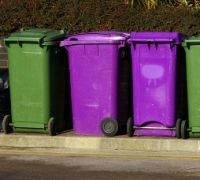

The Government has announced reforms to household and business bin collections in a bid to boost recycling rates and move to a "common-sense" approach to recycling in England. Essentially, the new plan will mean everyone across England can recycle the same things at home, work, school etc.
In addition, most households in England will see weekly waste collections for food waste by 2026 which will be stored and collected in separate bins, whilst dry mixed recycling will continue to be stored together in the same bin. However, a key question surrounding weekly food waste collections will likely be about how financially-strained local authorities will be able to afford to add this to their current waste collection responsibilities.
England currently recycles around 44% of its waste, which has been constant for the past 13 years. It is hoped that by standardising what can be recycled across all local authorities in England, people will be more confident about what can be recycled. Environment Secretary Therese Coffey said, "Simpler recycling will help us all recycle more easily, doing our bit to help save the planet and make the best use of precious resources that we use every day. Alongside weekly food waste collections, we are ending the postcode lottery of what you can put in your bin so that wherever you live in the country, you will be able to recycle the same products with confidence."
The Environment Act 2021 currently contains a future amendment to the Environmental Protection Act 1990 which will result in the separate collection of recyclable household waste. As indicated earlier in the year by Prime Minister Rishi Sunak, the Government is keen to avoid multiple household waste bins. However, under that future amendment, if it is not technically or economically practicable to collect recyclable household streams separately, then they can be collected together. This seems to be the exemption that the Government will rely on when ensuring that dry mixed recycling will continue to be collected together.
On 25 October 2023 the Government published a press release which outlines the new requirements for recycling for local authorities, where all:
Through statutory guidance, the Government proposes that local authorities will collect residual (non-recyclable) waste at least fortnightly as a minimum. On top of that, the government wishes to introduce weekly food waste collections for recycling or composting from households. All non-household municipal premises in England will need to arrange separate food waste collections, but will not be required to commit to weekly collections of such waste.
The Government also set out the timeline for the implementation of the revised waste collections:
For more information see: